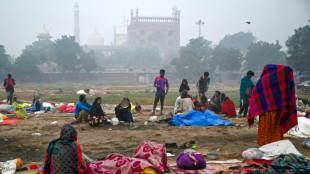

Spain swelters in latest searing heatwave
Spain was sweating Sunday as its latest summer heatwave took hold, the fourth of the season, with the mercury soaring notably in the northeast and the south of the country.
Temperatures rose across most of the peninsula, reaching above 40 degrees Celsius (104 Fahrenheit) in the northeastern regions of Catalonia and Aragon, and reaching almost 44C in parts of the southern Andalucia region, the AEMET weather agency said.
Forecasters said the latest bout of heat was due to intense sunshine over a warm and stable air mass, with the heatwave also affecting the basins of major rivers across the country.
In Madrid, where temperatures were hovering around 38C, many said the hot nights were the hardest thing to bear.
"The worst thing about a heatwave is that you don't sleep well at night," 69-year-old Antonio Tort told AFPTV in the city's Plaza Mayor.
"During the day you can stay in and drink a lot, but at night, you just can't sleep and you don't wake up in a very good mood."
Victor Bernardo, a 33-year-old tour guide holding a blue umbrella agreed.
"The summer months here in Madrid are a bit tough because it's so hot and dry but we manage," he said.
"There are times when the heat is even more noticeable at night than in the day because the heat accumulates in the ground all day then it seeps out at night," he said.
The heatwave was expected to last until Thursday with temperatures seen peaking on Monday and Tuesday.
Since Tuesday, hundreds of firefighters have been battling a vast wildfire on the holiday island of Tenerife in the Canary Isles which has so far forced the evacuation of more than 12,000 people.
The blaze broke out after the Atlantic archipelago suffered a heatwave that left many areas tinder dry.
More than 75,000 hectares (185,000 acres) of land have burned in Spain since the beginning of the year, after a record in 2022 when more than 300,000 hectares were destroyed by wildfires, according to the European Forest Fire Information System (Effis).
As global temperatures rise due to climate change, scientists have warned heatwaves will become more frequent and intense and have a much wider impact.
E.Goossens--JdB



